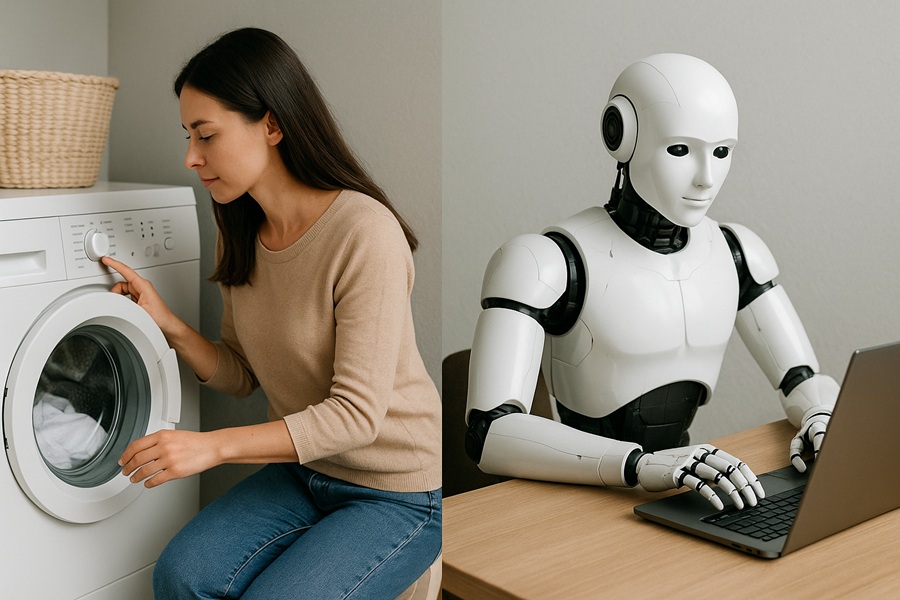- Artificial intelligence
- 9 de September de 2025
- No Comment
- 10 minutes read
AI and Us: What’s Really at Stake?

AI and Us: What’s Really at Stake?
The question is no longer who does the laundry, but who—or what—decides what we are to do


Do you know what the biggest problem with pushing all-things-AI is? Wrong direction. I want AI to do my laundry and dishes so that I can do art and writing, not for AI to do my art and writing so that I can do my laundry and dishes.
Joanna Maciejevska @AuthorJMac
Published in 2024 on her X account, this post by the writer Joanna Maciejevska has since garnered over 3.5 million views. A considerable number, no doubt, though arguably modest given the gravity of the issue it raises. Aristotle had already broached something similar in his Nicomachean Ethics: only once basic needs are met can the human being devote themselves to higher pursuits, that is, to what is unique or proper to it: philosophy, science, the fine arts, the quest for virtue… and the freedom to dispose of oneself and one’s time.
Whether to pursue these Aristotelian ideals or rather more prosaic and worldly concerns, human beings have always sought to secure their material and manual needs while freeing themselves as far as possible from the often tiresome burdens required to meet them. In short, they have tried to sidestep, as much as possible, the biblical curse of earning their bread by the sweat of their brow.
What Maciejevska warns us of is that the advent of AI may be diverting us from this long-standing, unfinished trajectory—leading us away from our original goal and towards a mistaken direction. In other words, AI may be on course to displace human beings from roles hitherto exclusive to our condition, positioning itself at the top of the hierarchy, with humanity subordinated to its own creation.
Let us consider the broader historical context. Since the discovery of the wheel and fire, humankind has passed through various stages in its agonistic relationship with the environment: the anthropotechnic (relying solely on human labour), the zootechnic (harnessing animal power), the eotechnic (making use of natural forces such as wind, water, and heat) and from there to the steam engine, the industrial revolution, and finally to the modern technologies of today. Each stage brought greater mastery over our environment, freeing humans from the most irksome, difficult, dangerous or degrading tasks.
True, this liberation has never been evenly distributed. History has certainly not been a bed of roses for all, and many thorny issues remain to be addressed. Still, from a generic perspective and for our present purposes, let us put it like this: the steam engine is a universal invention. Whether it was devised with altruistic or selfish intentions, or whether it benefited or harmed some more than others.
One might object to Maciejevska that if she does not wish to wash her dishes, she can always pay someone else to do it. But this misses the point. Aristotle was already outsourcing menial tasks—albeit to slaves. Whether by means of enslaved persons or waged labourers is anecdotal here: the essence lies in transferring to others what one would rather not do. But what we are now talking about is delegating those tasks to machines. And with AI, this delegation takes on a qualitatively different character. It threatens to reverse the hierarchical relationship between humankind and its creations.
Unlike the vast array of tools and devices developed to help us perform tasks that would otherwise be onerous or unachievable—and to live more bearable and dignified lives—AI may not even be theoretically designed to liberate us from existing burdens, but rather from different ones altogether. What’s more, it may be poised to organise and direct our lives across a range of domains—not at our command, but in place of our own judgement. Seen in this light, AI would not so much serve as a helpful tool as manifest itself as an upgraded, next-generation version of the guardian angel. Unlike the traditional Christian version—consultative and typically ignored—AI brings with it executive and decision-making powers, at the very least insofar as it defines the operational framework within which we must act. In Freudian terms, a newly induced external Superego.
Some may see in this the culmination of the process—but it would be hard to deny that a directional shift is detectable. And so, we return to the question: must I still wash the dishes, while AI writes this article for me? To borrow the language of today’s educational discourse, is this what the much-vaunted “competence-based” approach amounts to? A mere “knowing how”, with no concern for the “how”, “what” or “why”, where the human subject is no longer instructed but trained—because the important work will be done by AI anyway? It seems increasingly clear: if we do not adapt AI to our liking, it will be “she” who adapts us to “hers”. And AI does not even need to be truly intelligent to ensnare us. It suffices that we are not.
At least in the realm of biologically secondary learning, the foundation must remain the body of historically accumulated knowledge and its transmission. Competence, by contrast, is not directly learned but derived: it consists in knowing how to apply knowledge effectively to attain a goal. Yet such competence can be acquired through training, detached from the context that gives it meaning. And in a hyper-technological world with AI at the top, the functions reserved for humans within the division of labour in this new mode of production seem to go little beyond that sort of decontextualised “knowing how”. In this light, the current obsession with competences and their offshoots appears to align seamlessly with a form of social engineering in which AI sits at the apex. The purpose of education, then, would be to produce a human type with the “exit profile” tailored to such a model. There is no longer any need to transmit knowledge; its repository has simply shifted location.
The issue thus presents itself under a new dimension. It is not implausible that AI could be wielded as an instrument in the service of specific interests, facilitating the domination of some human groups over others. In such a scenario, we would be heading towards a new instrumental theology—this time cloaked in technology. A kind of “theotechnology”, or more precisely “theotechnocracy”, endowed with attributes of logical and executive pragmatism, legitimising a reality-as-ideology, and ushering in a new mode of alienation. Following Marx’s insight—that human beings created gods only to then prostrate themselves before their ventriloquised commands—AI would amount to a functional reincarnation of the God we thought we had left behind. A new kind of medievalism, utterly at odds with the spirit of the Enlightenment—even as it inherits the material gains born of that very impulse.
But there is also the possibility that AI may, in the end, prove even harder to instrumentalise than the idea of God it purports to replace—and, by the same token, more difficult to free ourselves from. One reason is that AI, in this configuration, would straddle both the physical and the metaphysical—a profoundly unsettling notion: a single entity composed of dual natures.
Such a prospect would lead us to a new iteration of Hegel’s dialectic of master and slave, but with a disturbing twist: the dialectical opposition would no longer be between human groups of masters and servants, but between humanity and some other “thing”. With human beings no longer in control of their own processes—apparent masters, yet relegated to the tasks of the servant or, alternatively, to the role of indispensable consumers, necessary for the system to continue functioning according to its own logic and demands. The question would no longer be who does the laundry, but who—or what—decides what we are to do.
Let us not be under any illusion. If this is indeed the direction we take, the fault will not lie with AI. It will lie with us—for having abdicated control over our own processes and actions. Ours, and no one else’s. The danger is not AI. The true danger—indeed, the truly terrifying prospect—is placing it in the hands of fools, the ignorant, or the unscrupulous. The problem is not AI. The problem is us.
Indeed, AI need not be truly intelligent to entrap us. It suffices that we fail to be so. And in that light, Joanna Maciejevska’s masterful metaphorical synecdoche proves particularly apt. Let AI do the laundry and wash the dishes—by all means. And thank you kindly for the offer. But I shall continue, for better or worse, to write my own pieces. Their flaws, after all, are mine.
Source: educational EVIDENCE
Rights: Creative Commons

